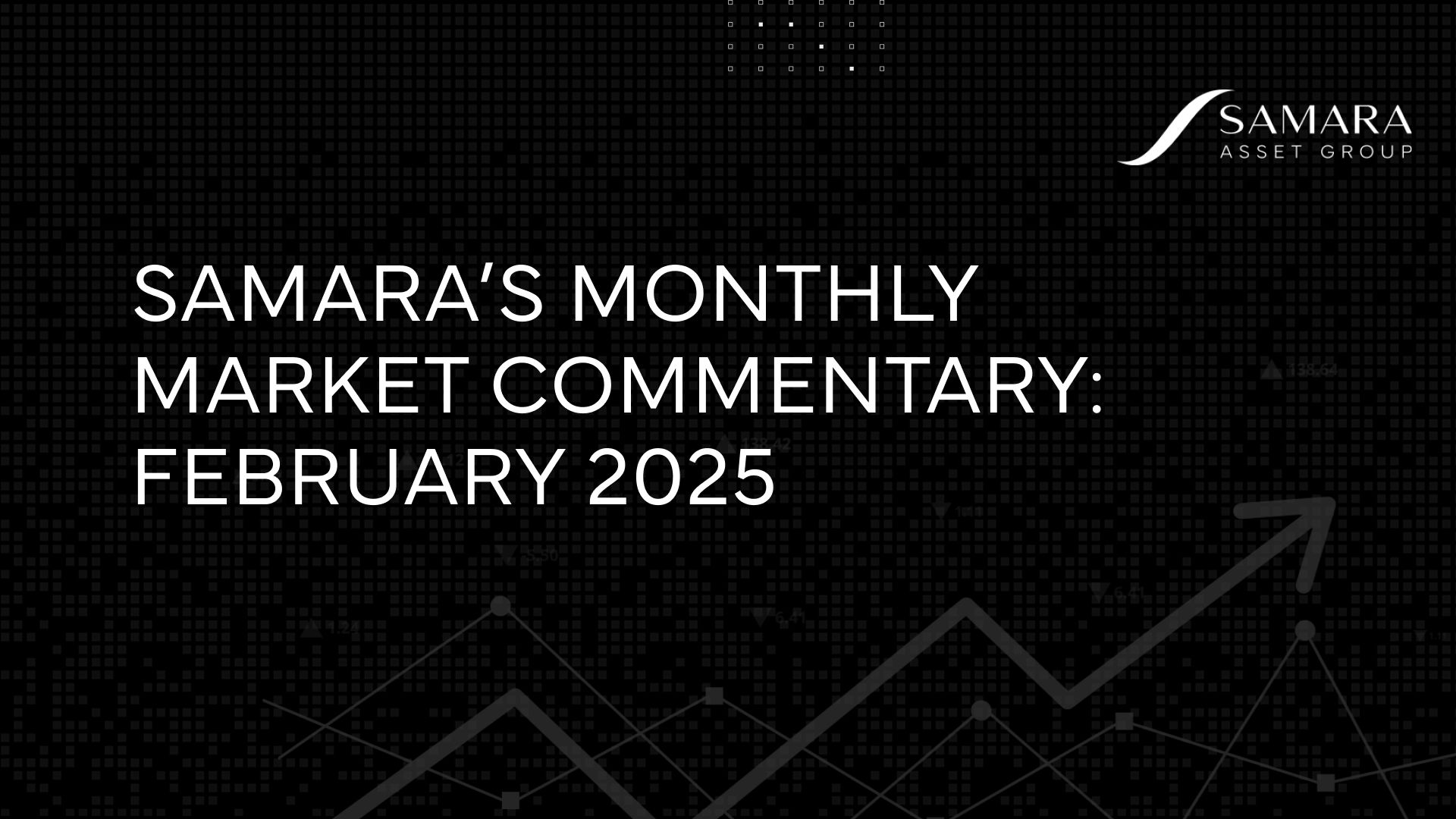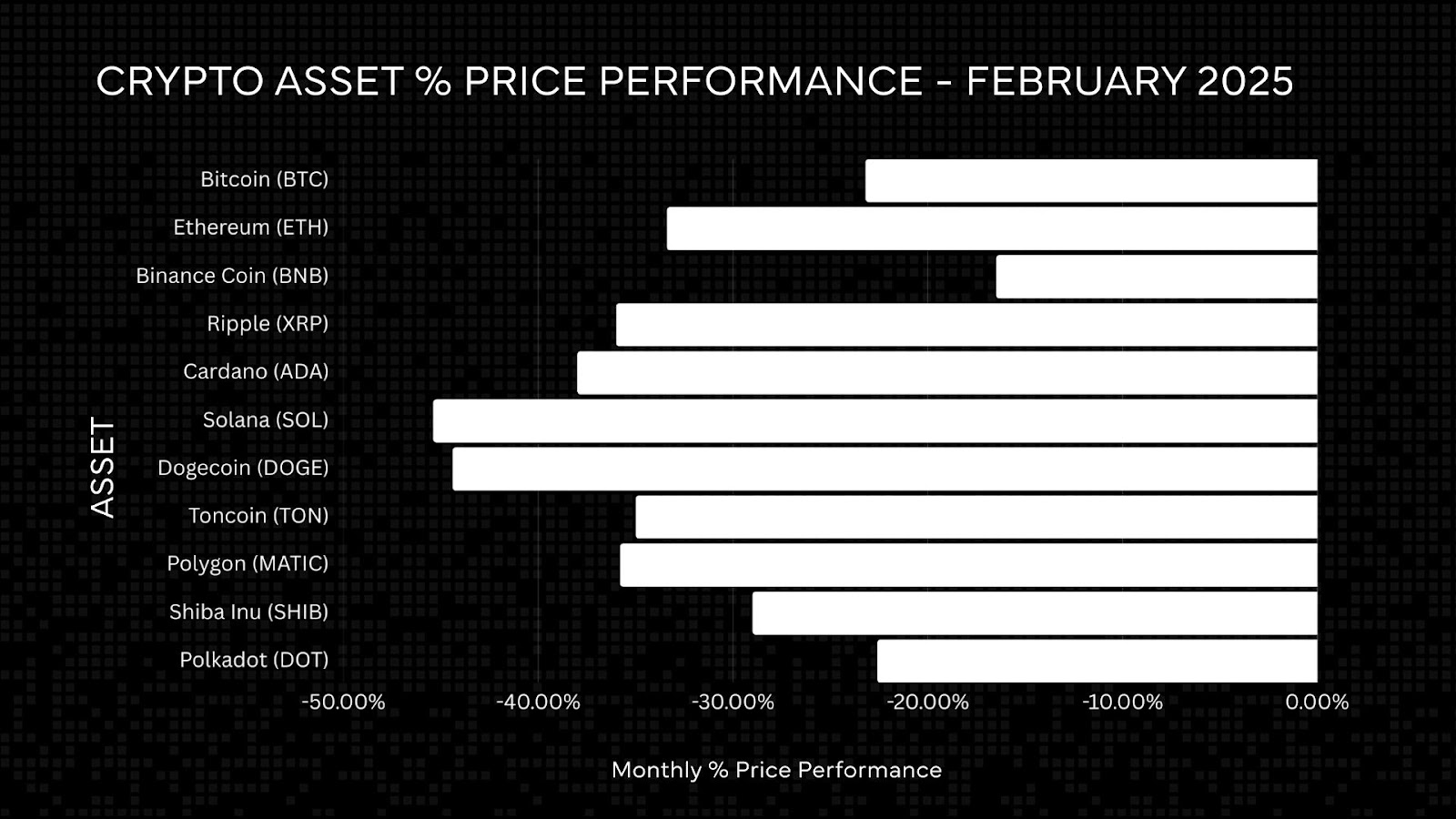Bitcoin
Bitcoin CPI
Venture Portfolio
Funds
Market Insights
Indicators
About
Contact

March 3, 2025





Stay up to date with our monthly market commentary:
The price of Bitcoin (BTC) dropped by over 23% in February, closing the month at around $80,000.
This month's biggest news was the hack of the ByBit crypto exchange, where $1.46 billion worth of ETH was stolen. North Korea’s Lazarus Group was reportedly behind the attack.
While this was the largest exchange hack in the history of the digital asset market, the industry quickly came together to mitigate the fallout of the hack. The exchange promptly reacted by replenishing its reserves through a mix of emergency loans and large deposits.
ByBit secured nearly 447,000 ETH through emergency funding from firms such as Galaxy Digital, FalconX, and Wintermute. They also conducted a new proof of reserves audit by cybersecurity firm Hacken, which confirmed that the exchange has successfully restored its reserves.
The price of Bitcoin and the rest of the digital asset markets were affected by the hack as well as the Trump administration's new tariff announcements.
After putting a 10% tariff on Chinese imports on February 4, the Trump administration wants Europe, Canada, and Mexico to pay a 25% tariff on imports going forward. This plan by the Trump administration sent the markets into a spiral, digital assets and equities—especially tech stocks—saw large liquidation waves.
With the recent price correction, Bitcoin is down over 25% from its all-time high of $108,700 just over a month ago. But this isn’t the first time Bitcoin has seen a drawdown of this size during a bull market. In previous bull markets, BTC experienced several 25% price drops before continuing to rise in value.
The crypto asset markets closed the month in the red due to the ByBit hack and the tariff announcements by the Trump administration, which frightened capital markets across the board.

While equity markets–most notably tech stocks–took a hit following the tariff announcements, the crypto asset market was also affected by this news. Bitcoin corrected by over 23% to trade around the $80,000 mark to close the month.
Ether (ETH) was among the hardest hit digital assets in February, dropping by 33.4% as a result of the ByBit hack, where over 400,000 ETH, and 100,000 in stETH and mETH were reportedly stolen.
Several leading digital assets by market cap also decreased by more than 30%, with some, such as Solana (SOL) and Dogecoin (DOGE), falling by 45% and 44%, respectively.
Binance's BNB token was the best-performing digital asset this month, with a decrease of only 16.5%. After two years, the biggest crypto exchange in the world was allowed to accept U.S. customers again. Deposits and withdrawals in U.S. dollars have been re-enabled, and trading has increased.
Spot Bitcoin ETF net inflows have slowed in February while the first-ever U.S. Digital Assets Subcommittee hearing took place.
While the spot Bitcoin ETFs had a stellar start to 2025 in January, February saw a decrease in net inflows into Bitcoin ETFs.
Since the announcement of the ByBit hack, ETF investors seem to have been more cautious. In the days after the hack, all eleven spot Bitcoin ETFs saw five days of consistent outflows, and overall, in February, there were only four net positive inflow days.
The last time all ETFs saw these kinds of outflows was in May and September of 2024.
Due to Bitcoin's price drop and the decrease in inflows this month, all spot Bitcoin ETFs combined hold just over $95 billion in net assets.
The Trump administration announced that it would form a dedicated task force to investigate the integration of digital assets in the U.S. government. The first Subcommittee hearing on the topic took place in February.
For its first-ever meeting, the committee focused on stablecoins and how the government would form bipartisan legislation to regulate digital assets and stablecoins. During the hearing, committee members focused on better solutions to integrate digital assets into today’s banking infrastructure.
One of the main concerns today is ensuring digital assets comply with anti-money laundering (AML) rules and improving self-custodial service providers’ compliance efforts to protect users from fraud.
These hearings and the upcoming legislation are some of the main focus points of the Trump administration's efforts to help make the U.S. a pioneer in the digital assets ecosystem. The results of these hearings will also significantly impact a potential strategic crypto reserve.
Strategy’s Michael Saylor announced a $42 billion capital plan with a $21 billion equity offering in October. In February, the company rebranded from MicroStrategy to its new name, Strategy, and bought 7,633 and 20,356 BTC, totaling 499,096 BTC on the company’s balance sheet.
Metaplanet, a publicly traded Japanese company, announced the issuance of moving strike stock acquisition rights to raise up to ¥116 billion to buy Bitcoin last month. In February, the company bought 269.43 and 135 BTC, totaling 2,235 BTC on its balance sheet.
Semler Scientific, a publicly traded company in the U.S., acquired 871 BTC, totaling 3,192 BTC on the company’s balance sheet.
*Closing price data is from February 28, 2025, at 08:50 CET